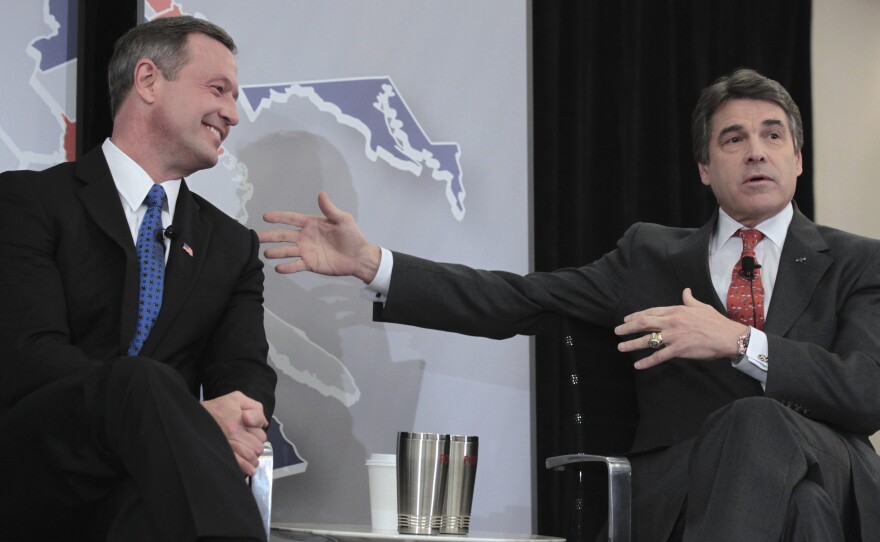Rick Perry wants your business.
The Republican governor has been turning up in other states, touting the wonders of Texas and promising business owners they'll find lower taxes and more manageable regulation there.
"It does help get the word out to business leaders that may be frustrated," says David Carney, a longtime consultant to Perry. "Going in person can get literally hundreds of thousands of dollars of free media coverage."
Needless to say, other governors aren't so fond of Perry's efforts. Not only does Perry want to chip away at their tax bases, but he hasn't shied from criticizing the policies they favor right on their home turf.
And Perry's poaching can be construed as partisan in nature. He hasn't been going around to states led by his fellow Republicans.
"Governors don't poach companies publicly in states with governors from their own party," Carney says.
The increasing willingness of governors to come into each other's states and spat openly is not just a violation of longstanding norms, but yet another sign of the increasing polarization of our time.
"There are so many issues at the state level that you'd think wouldn't have Democratic or Republican approaches, but increasingly they are not perceived that way," says John Weingart, director of the Rutgers University Center on the American Governor.
Governors Picking Fights
Governors have always taken ideas from each other, whether it's a breakthrough in education policy or a clever way to promote the arts.
But as Weingart suggests, they increasingly see themselves as playing on different teams. Republicans want to shrink the state and empower employers, while Democrats are committed to investing in human capital and infrastructure.
Their philosophical disagreements are spilling over across each other's borders. Democratic Gov. Martin O'Malley of Maryland took a shot at New Jersey's Chris Christie last year on CBS's "Face the Nation," saying that the Garden State's bond rating had been downgraded on the Republican's watch.
Christie countered by saying that O'Malley is "not that smart, he's not that good, but he is flippant, so I give him credit for that."
Christie also took a shot at Dannel Malloy of Connecticut for raising taxes. Malloy in turn knocked Christie for not properly funding his state's pension obligations.
"You've got a case where there have been different paths taken in different states," says Andrew Doba, Malloy's communication director. "When you're talking about these things, it's natural to compare yourself to other states."
Ways To Work Together
As with members of Congress, today's governors take such different approaches on a range of issues that it's harder for them to get along. It wasn't always this way.
There used to be less daylight between governors on a number of issues. But even when they differed, governors used to be better equipped to speak with one voice when arguing for the needs of states in Washington.
The landmark welfare overhaul law of 1996, for instance, was largely built on state-level experiments. In those days, the National Governors Association (NGA) was frequently ranked as the most influential lobbying force in the capitol.
A decade ago, however, the organization nearly came apart. Republican governors publicly complained that NGA's staff was too liberal. The group fired its lobbyist in response but has never fully won back the affection of some GOP governors.
"It's lost its cache," Carney says. "A lot of the governors still participate, but some don't. There's less common ground on a lot of these issues."
NGA still demands attention, but many governors direct their time and efforts toward the Democratic or Republican governors associations, which are not only partisan in nature but fundraising machines for elections.
Get Out Of My House
Governors now have the same problem that bedevils Congress. They think each other's ideas are stupid and they don't spend enough time getting to know one another as individuals to gain empathy for each others' positions.
Even 20 years ago, governors who visited other states to campaign for their party's candidate would not speak ill of the incumbent. And that "host" governor would extend every courtesy, offering visiting governors protection from state troopers.
Malloy, the Connecticut governor, went out of his way to greet Perry when the Texan came to his state in June in hopes of convincing gun makers to relocate further south. "We showed him some old-fashioned Yankee hospitality, as the governor said," Doba says.
It might have been smart politics. Where Democrats have complained about Perry's visits -- such as in Missouri and Maryland -- it's only garnered more attention from media, which are always willing to highlight political combat.
When Perry visited Maryland last week, O'Malley not only penned an op-ed touting his state's virtues over Texas, but went on CNN's "Crossfire" to debate him.
After O'Malley bragged about the "great companies" in his state, Perry said, "We'll recruit them."
"You're welcome to try," O'Malley said.
Copyright 2013 NPR. To see more, visit www.npr.org.






